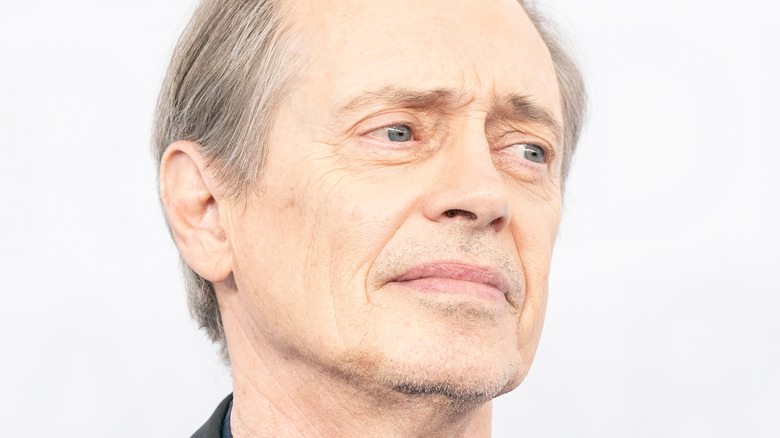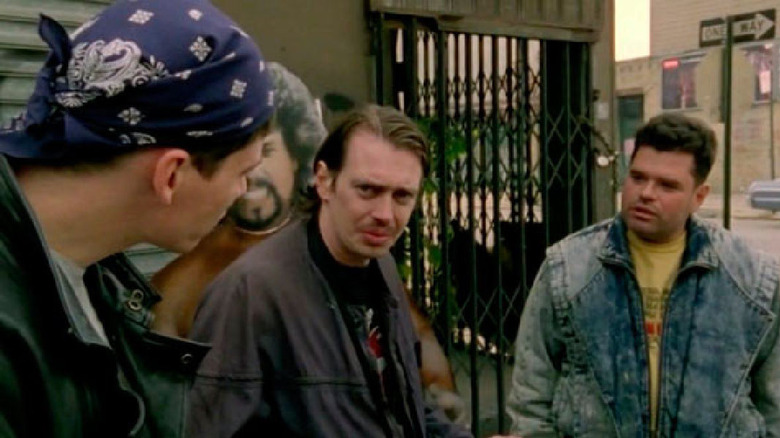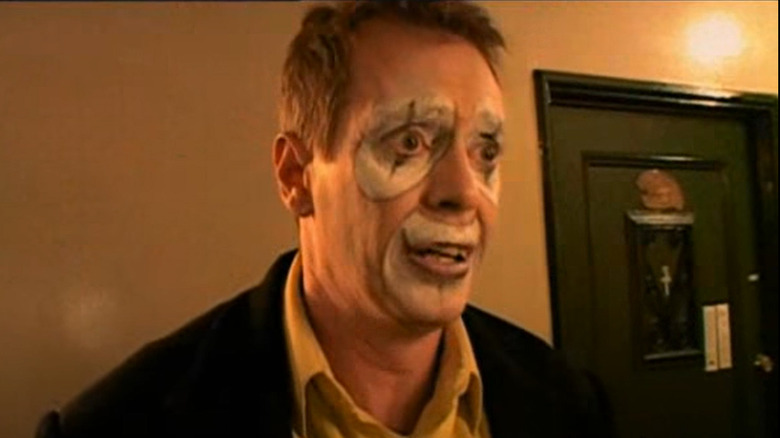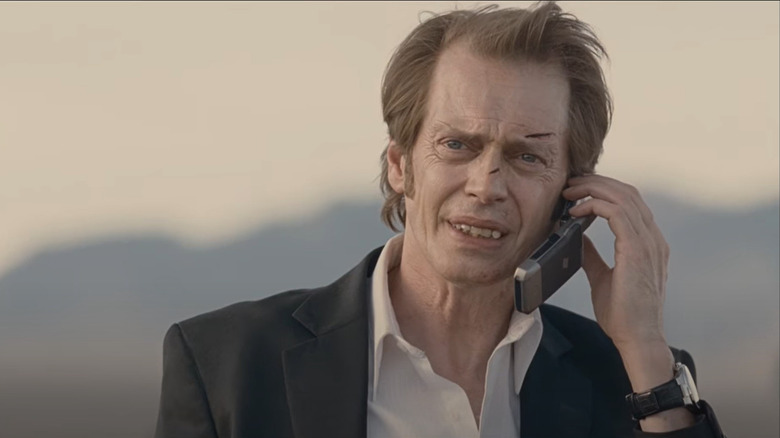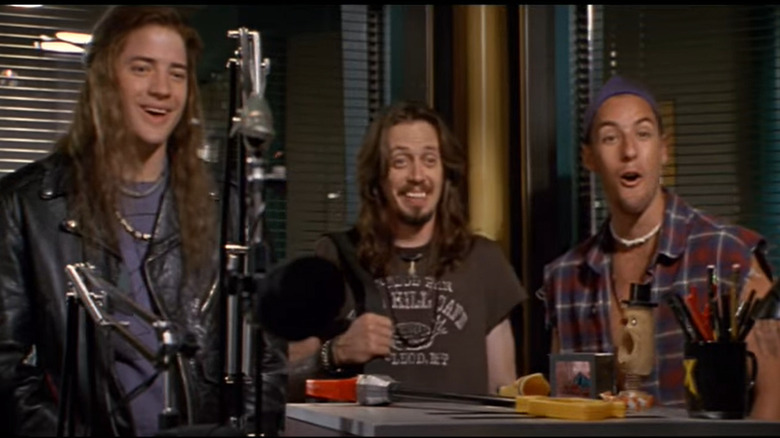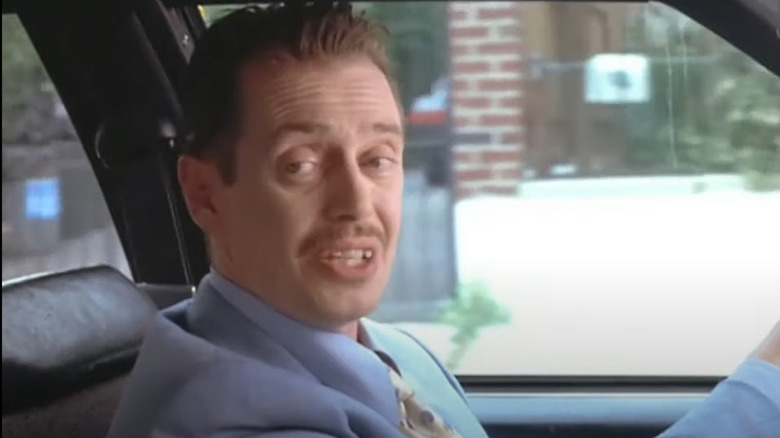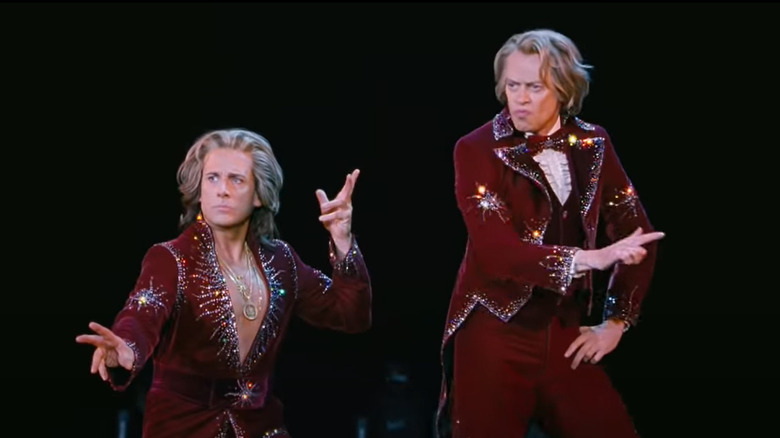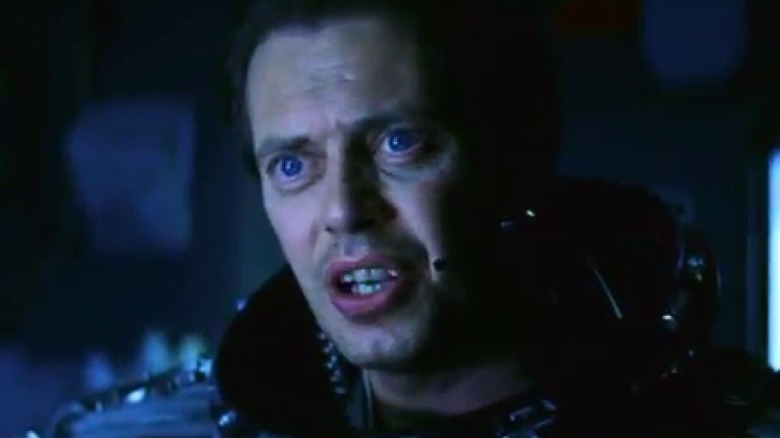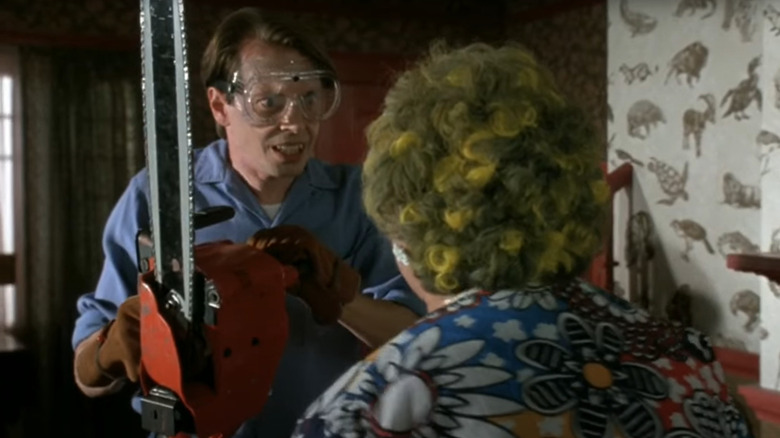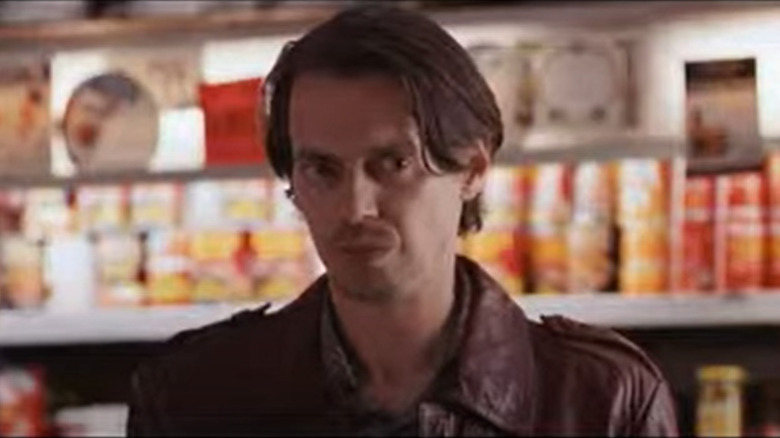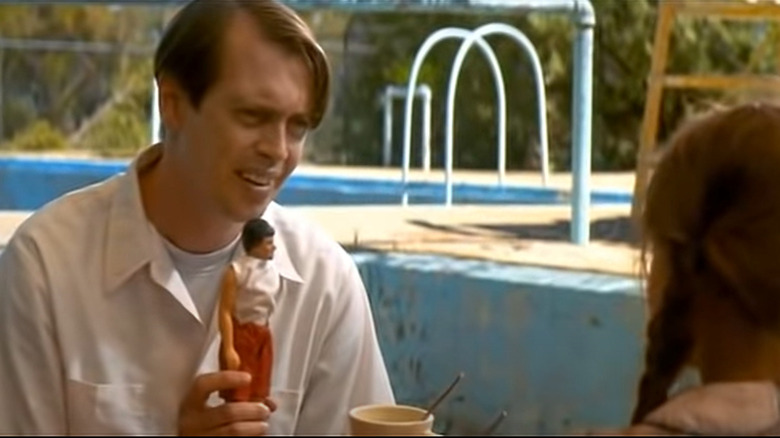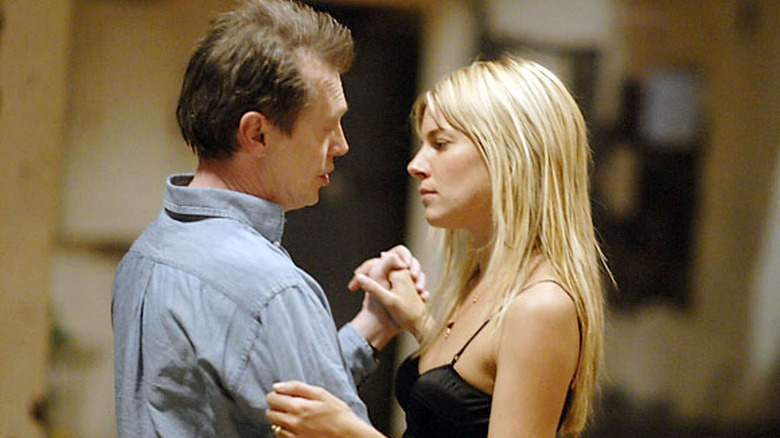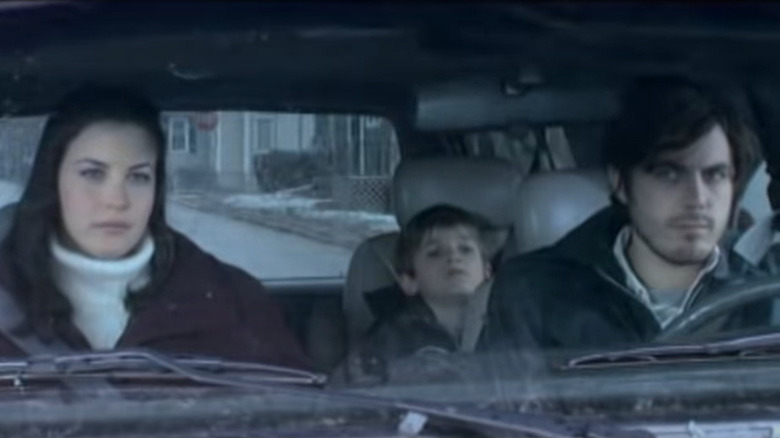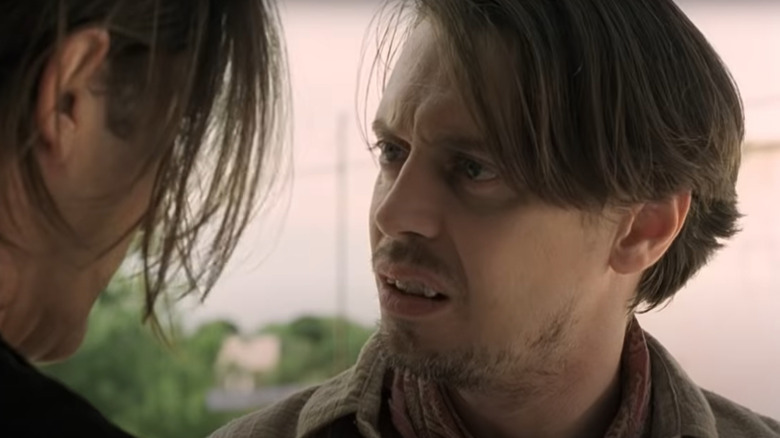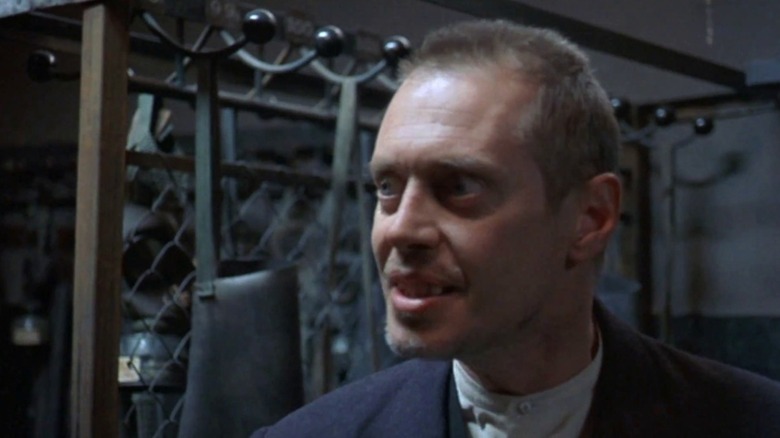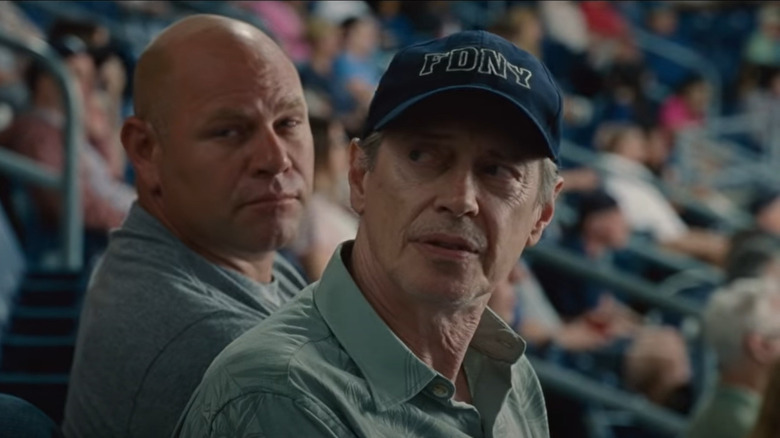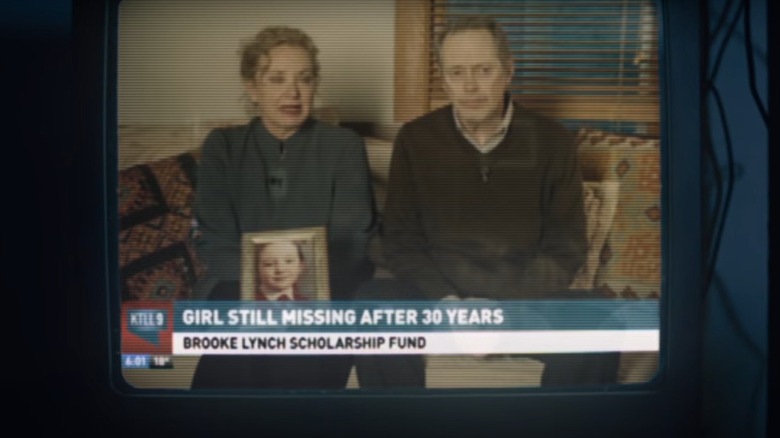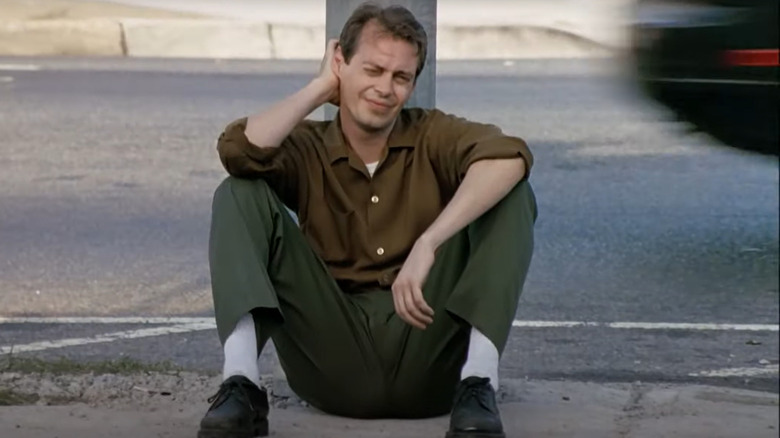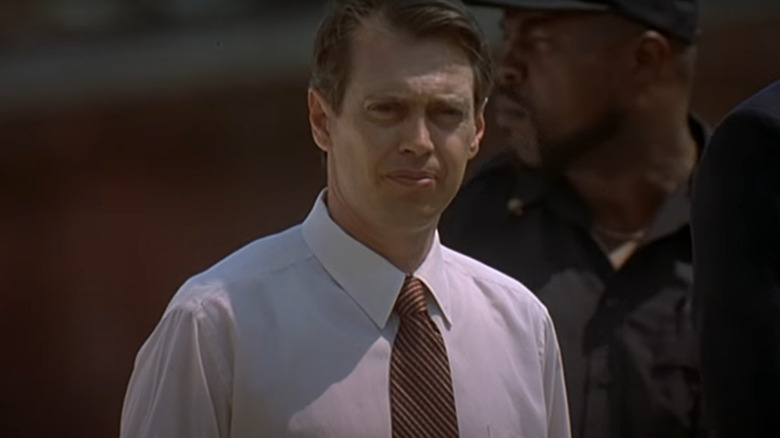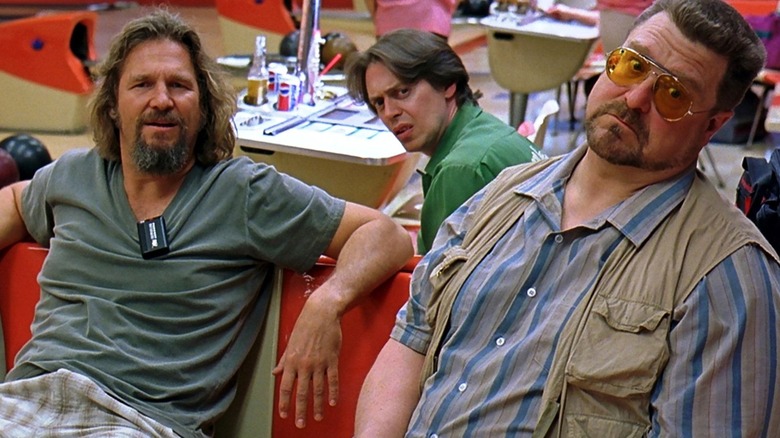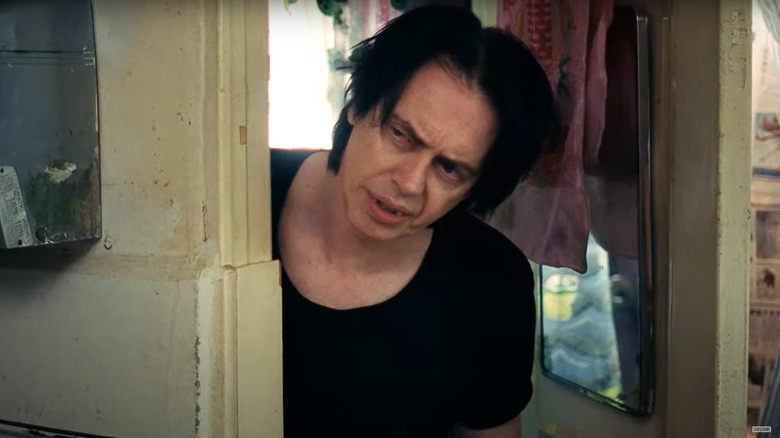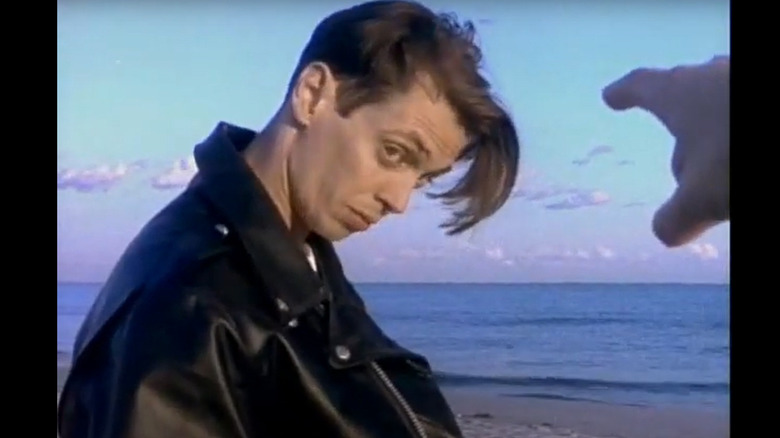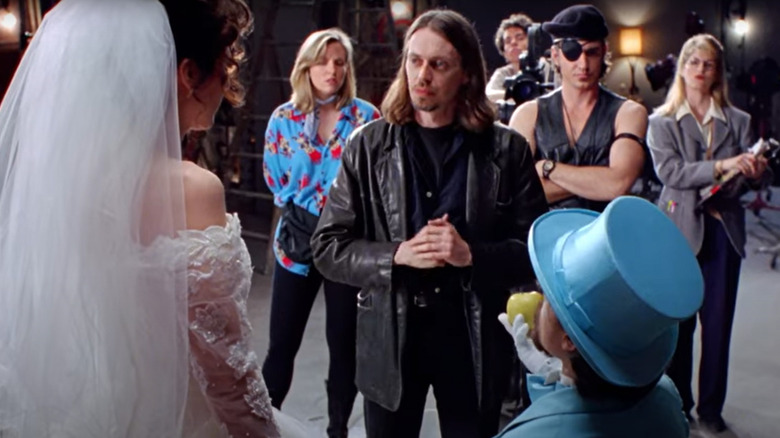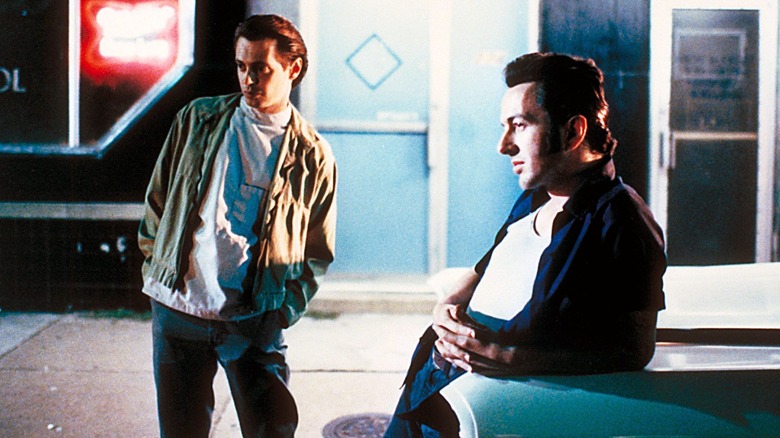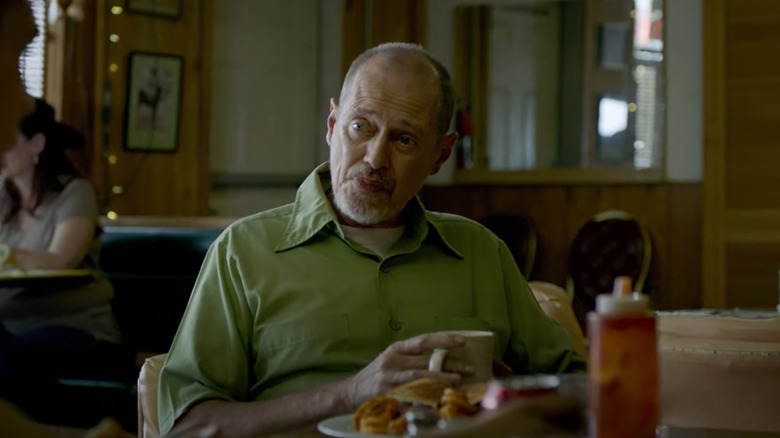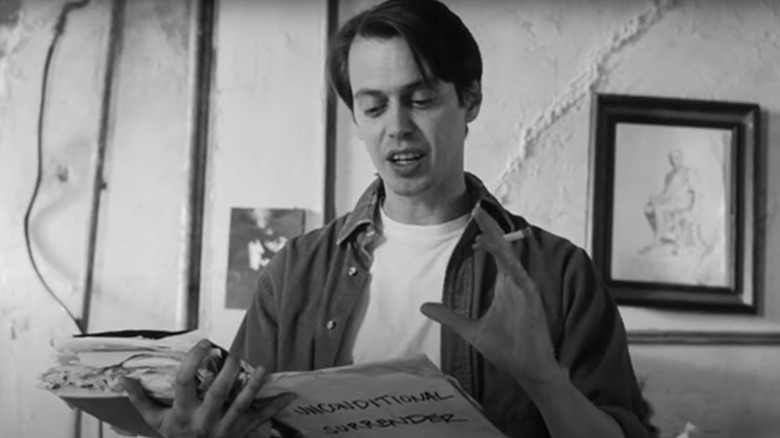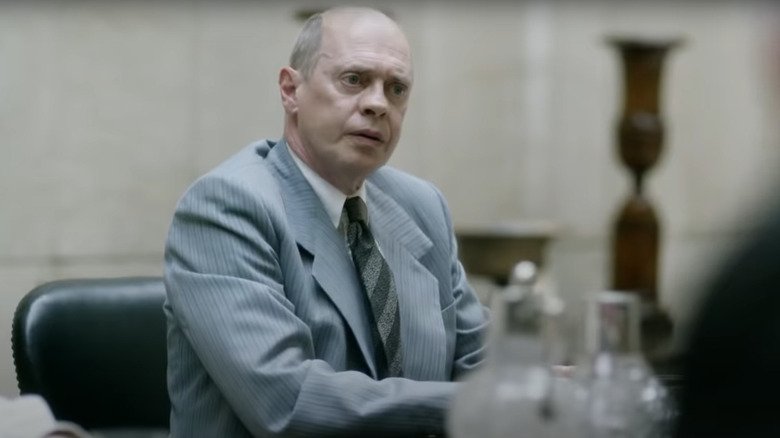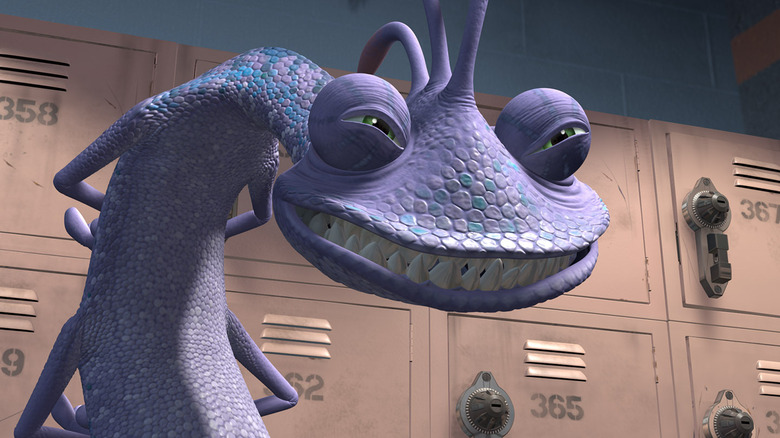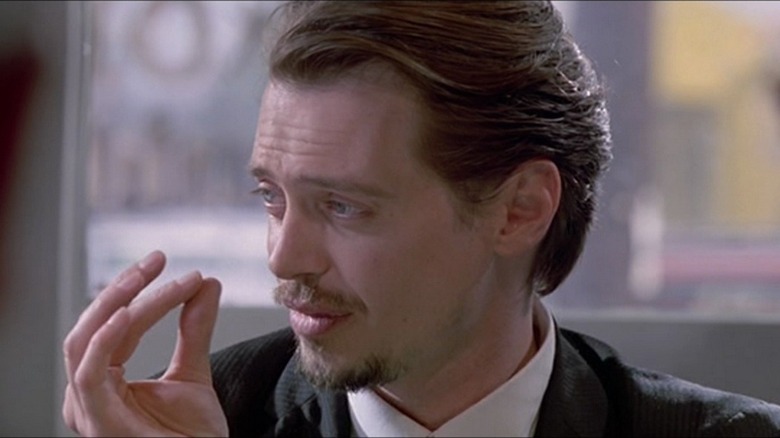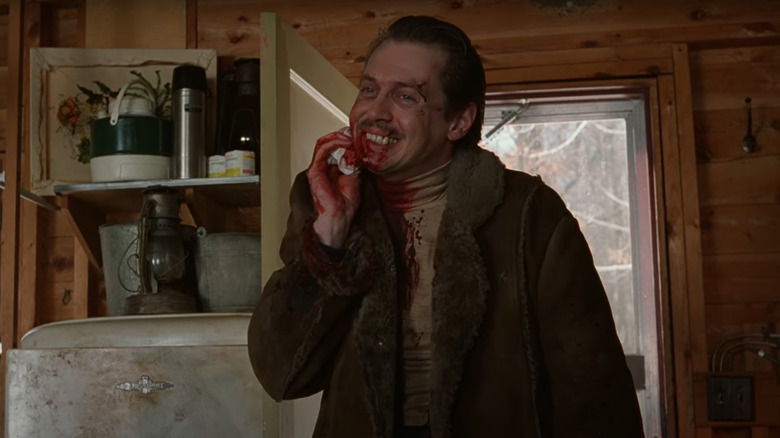Every Steve Buscemi Movie Ranked Worst To Best
The quintessential character actor of his generation, Steve Buscemi provides hope for unconventional-looking folks everywhere.
Has anyone ever told you, without being specific, that you're "funny"-looking? Thanks to Buscemi, we know for sure that you're not immediately disqualified from major movie stardom. You could even rise to the status of a legendary meme, if you play your cards right.
The Brooklyn-born former New York City firefighter officially began his cinematic career in the mid-1980s independent film scene, and found his way into the supporting cast of several essential films of the 1990s. Appropriately enough, Buscemi currently plays God in the TBS series "Miracle Workers," also starring Daniel Radcliffe.
Buscemi's done a plethora of other significant TV work, but we're here to rank his movies. Speaking of which, he's got at least 150 film credits to his name, and ranking them all is a little bit of a fool's errand. So not including television, not including his substantial oeuvre of voice acting, and not counting roles small enough to be considered "bit" parts — a necessary but somewhat arbitrary distinction, we realize — what follows is a loose ranking of Buscemi's most outstanding achievements in cinema.
30. The Search for One-Eye Jimmy (1994)
Lacking enough reviews to warrant a proper Rotten Tomatoes score, 1994's "The Search for One-Eye Jimmy" is interesting for its relevance to film trivia and as an also-ran amongst the '90s auteur filmmaker boom.
There are several big names involved in "One-Eye Jimmy" — Buscemi, Sam Rockwell, Samuel L. Jackson, John Turturro, Aida Turturro, Jennifer Beals, and Tony Sirico — and it's nobody's best work. The directorial debut of eventual "Seinfeld" writer Sam Kass didn't pan out, but evidently a few show business agents with generally sound judgment thought it might at one point.
Buscemi plays the sleazy brother of Rockwell's titular Jimmy. The cycloplegic sibling disappears, prompting a crew of student filmmakers to scramble around Brooklyn in an attempt to uncover his whereabouts (hence the title). Fans of the "The Big Lebowski" can observe that "One-Eye Jimmy" marks an early onscreen instance of John Turturro dancing in tight pants — a skill he'd later apply to great acclaim as expert bowler and registered sex offender Jesus Quintana.
29. 13 Moons (2002)
The world knows Steve Buscemi from a dense handful of wildly popular films, and principally recognizes Peter Dinklage from his turn as Tyrion Lannister in HBO's "Game of Thrones." Meanwhile, even casual indie film buffs are probably aware that Dinklage and Buscemi have worked together on a semi-regular basis throughout their careers. It seems kind of presumptuous to assume Buscemi and Dinklage are good pals, but they might be, right? At any rate, the idea of Tyrion Lannister and Mr. Pink being BFFs in real life is certainly a pleasant notion.
"13 Moons" isn't their most well-regarded collaboration, but it earns a few points for its madcap premise. Buscemi and Dinklage play TV clowns Bananas and Binky, who reluctantly embark upon a series of misadventures prompted by philandering and/or attempted vehicular homicide.
While the ongoing legacy of Krusty makes squeezing any more juice out of the secretly sleazy clown trope basically impossible, the easy back-and-forth between Buscemi and Dinklage keeps "13 Moons" comfortably removed from total charmlessness. Dinklage isn't the only frequent Buscemi associate involved — "13 Moons" also costars Jennifer Beals, while Alexandre Rockwell directs.
28. Saint John of Las Vegas (2009)
The first and final feature-length film directed by Hue Rhodes, "Saint John of Las Vegas" features Buscemi as the titular John Alighieri, a compulsive gambler adapting to a nine-to-five office lifestyle. John's boss (Peter Dinklage) sends him to investigate the veracity of a stripper's (Emmanuelle Chriqui) possibly fraudulent car insurance claim in Las Vegas. Romany Malco and Sarah Silverman also contribute prominent roles, and a character played by John Cho may or may not burst into flames at one point.
While little noticed and mostly dismissed as aimless and underbaked by critics upon its release, "Saint John of Las Vegas" earns a few Buscemi-bonus points as one of his all-too-few stabs at headlining a project. It's a bummer that, for reasons at least partially beyond his control, "Saint John" doesn't quite land. The AV Club praises Buscemi's performance as "a model of understatement in a field of grotesques," which they definitely mean as a compliment ... we think.
27. Airheads (1994)
As mentioned earlier, movies that only include Steve Buscemi in a bit part were disqualified from this list. But Buscemi made his name as a character actor, not a leading man, therefore the majority of his film work falls under the category of supporting roles or, indeed, bit parts. According to a scan of his IMDb page, the most prolific professional relationship of Buscemi's career isn't with the Coen brothers or Quentin Tarantino — it's with Adam Sandler, by a mile.
The pair of offbeat performers appear in at least 14 projects together. While most of those movies are products of Sandler's Happy Madison Productions and only feature Buscemi for a few minutes of screentime, such is not the case for "Airheads." The monstrously underrated 1994 rock 'n roll coming-of-age comedy arrived in theaters the year before "Billy Madison" launched Sandler into mega-stardom.
Directed by Michael Lehmann of "Heathers" fame, "Airheads" stars Brendan Fraser, Sandler, and Buscemi as a struggling heavy metal trio called The Lone Rangers. Having lots of trouble getting noticed by record label reps, The Lone Rangers break into a radio station and threaten its staff with plastic replica guns in order to get their demo — a cover of Reagan Youth's "Degenerated" — played on the air.
Envision a light-hearted "Dog Day Afternoon" soaked in early '90s popular culture, and you'll roughly get the gist.
26. Double Whammy (2001)
Steve Buscemi has made some of his all-time best movies with director Tom DiCillo. Whether 2001's "Double Whammy" counts as one of those all-time best movies is a matter for debate; however, it is certainly a Tom DiCillo movie in which Buscemi costars, and that's never a bad combination.
Buscemi plays Detective Jerry Cubbins, who finds himself unexpectedly attracted to his professional partner, Detective Ray Pluto (Denis Leary). While that sounds like a compelling premise for a film all by itself, "Double Whammy" mostly focuses on Leary's character's recovery from a major career humiliation, various schemes unfolding in his apartment building, and his romance with a chiropractor played by Elizabeth Hurley.
While "Double Whammy" was never released in theaters, it definitely sounds like the sort of thing plenty of folks watched and halfway enjoyed as an early '00s Blockbuster rental. As some reviewers have noted, the disappointing response might be partially attributed to the fact that it's not as insightful or funny as DiCillo's previous movies.
25. The Incredible Burt Wonderstone (2013)
Steve Buscemi has definitely made some bad movies, but he's never done a movie that doesn't look like a good idea on paper (not counting his boldly unambitious, every-now-and-again endeavors alongside Adam Sandler).
"The Incredible Burt Wonderstone" stars Buscemi, Steve Carell at the height of his Michael Scott-generated mega-stardom, and Jim Carrey. The former play two old school magicians who grow complacent, and find themselves upstaged by Carrey's character — an obvious send-up of the self-serious and vaguely gothic Chris Angel or David Blaine-style of magician. "Burt Wonderstone" is noted as a uniquely spectacular box office bomb, failing to break a threshold of $30 million in box office receipts and thereby failing to earn back its production costs.
It's impossible to say exactly why audiences were so unreceptive. Obviously, far worse films have made much more money. Perhaps the moviegoing public was still too burned out from 2009's "The Prestige" and "The Illusionist" to get excited about another movie about magicians. Maybe fans of "The Office" were mad at Carell for leaving the show that propelled him from fame to ultra-fame. Or maybe the Warner Bros. marketing department dropped the ball.
Whatever the case, it definitely wasn't Buscemi's fault. Steve Buscemi cannot fail. He can only be failed.
24. Armageddon (1998)
Steve Buscemi is known mostly for independent and comedic films — not the over-the-top explosive blockbusters typically associated with director Michael Bay. Furthermore, putting "Armageddon" on any "best of" list is a little questionable. Critic Roger Ebert described the bombastic action-space travel romp as "an assault on the eyes, the ears, the brain, common sense and the human desire to be entertained." Many other critics weren't much gentler.
However, the star power of Bruce Willis and Ben Affleck, plus the era's penchant for gigantic disaster movies, amounted to significant financial success. "Armageddon" earned more cash worldwide than any other movie in 1998, and almost beat Steven Spielberg's "Saving Private Ryan" for most movie tickets sold in the U.S. that year.
Buscemi plays Rockhound, apparently a sexual predator and one of the oil drilling experts the U.S. government sends to space to help destroy a massive asteroid with a nuclear warhead. This might be the only movie where Steve Buscemi goes to outer space, and that alone warrants it a slot on his greatest hits collection.
23. Ed and His Dead Mother (1993)
At a glance, the supernatural comedy "Ed and his Dead Mother" looks like a lowbrow affair coasting on the conceit that viewers will find utter hilarity in an overweight old woman doing basically anything. Nevertheless, it sports a solid 50 percent in both critical and audience approval on Rotten Tomatoes and it's got some fans on Letterboxd, so it's got to have more going for it than ageism and anti-fat bias, right?
Buscemi stars as Ed Chilton, a real momma's boy who pays a necromancer (John Glover of "Batman and Robin" fame) to bring his recently-deceased household matriarch back from the grave. While his undead mother looks surprisingly intact for a zombie, Ed regrets his decision when she tries to run down his new girlfriend (Sam Sorbo, who definitely would have won a Linda Fiorentino lookalike contest in 1993) with a lawnmower.
Basically, if you think Buscemi only does certain films because Adam Sandler has compromising pictures or some other form of dirt on him, "Ed and His Dead Mother" proves this is not so — Steve Buscemi made ridiculously silly comedies before Sandler even entered the equation.
22. Twenty Bucks (1993)
"Twenty Bucks" follows an eponymous $20 bill as it's passed from person to person, unfolding into a series of very loosely connected vignettes. Relatively small though it may be, Steve Buscemi's "Twenty Bucks" segment feels significant enough to include here, since it entails a crime spree with Christopher Lloyd's character. We don't have to wonder too hard what it might look like if a much younger, time-traveling Buscemi costars in a live action "Rick and Morty" movie, because that's his role in "Twenty Bucks" with a sci-fi slant.
Appropriately enough, the movie itself feels like a segment in a chain indirectly linking a handful of careers. It's technically the first movie Buscemi made with Brendan Fraser before "Airheads," and one of two 1993 movies he made with Sam Sorbo, who looks even more like Linda Fiorentino in this than she does in "Ed and his Dead Mother." William H. Macy also appears in "Twenty Bucks," adding a "Fargo" connection to the mix.
21. Con Air (1997)
Anyone familiar with "Con Air" — directed by Simon West, who years earlier also called the shots for Rick Astley's "Never Gonna Give You Up" music video — knows it's an ensemble movie. Starring Nicolas Cage at the apex of his '90s action star heyday, the mid-air escape romp also features Buscemi, John Cusack, John Malkovich, Ving Rhames, Dave Chappelle, and Danny Trejo. For a change of pace, Buscemi's got some serious competition for most recognizable character actor in this movie.
As the cannibalistic mass murderer Garland "The Marietta Mangler" Greene, Buscemi plays one of the most disturbing individuals on the maximum-security prison transfer plane hijacked by Cyrus "The Virus" Grissom (Malkovich) and a collection of criminal associates. Garland arrives on the aircraft, nicknamed "Jailbird," in restraints instantly reminiscent of Hannibal Lecter. One of his co-passengers recalls that Garland has allegedly killed more than 30 people in a manner that "makes the Manson family look like the Partridge Family." In an astounding twist, Garland Greene eventually turns out to be a comedy relief character, providing joy and levity to an otherwise violent and cynical story.
Perhaps "Con Air" is not without its flaws, but it's the only movie — aside from one we'll get to much later on — that simultaneously maximizes Buscemi's abilities for horror and comedy. Scary-funny Buscemi is everyone's favorite version of Buscemi.
20. Interview (2007)
When some folks think of Steve Buscemi's directorial resume, they immediately think of the handful of episodes of "The Sopranos" he ushered into existence — particularly Season 3 fan favorite "Pine Barrens," aka the one where Christopher and Paulie get lost in the woods. As it happens, Buscemi has also directed a few films in his day.
The first one to pop up on this list is "Interview" — a relatively little-seen remake of a Dutch romantic-ish drama starring Buscemi and Sienna Miller. The mere fact that he acts and directs means "Interview" contains more straight-up Buscemi than most of his films — although not as much as a movie where he stars, directs, and writes the screenplay (that's coming up).
In "Interview," Buscemi plays hard-luck politics reporter Pierre Peders, who begrudgingly accepts an assignment to profile Katya, a celebrity actress played by Miller. It sounds like the plot of a romcom, but the events of the story — most of which transpire during one long conversation between Katya and Pierre — do not play out in a manner any sensible person would describe as "cute."
Michael Buscemi — Steve's brother, and a successful actor in his own right — plays Pierre's brother Robert, providing "Interview" with some bona fide bonus Buscemi.
19. Lonesome Jim (2005)
Steve Buscemi directs — but does not act in — "Lonesome Jim," a 2005 indie comedy starring Casey Affleck and Liv Tyler. A failed writer appropriately named Jim (Affleck) returns to his hometown after a disappointing stint living in New York. His relationship with his immediate family remains awkward, but Jim strikes up a romance with Anika (Tyler), a quirky local nurse.
Though a notable financial failure — pulling in less than $175,000 upon its theatrical release — "Lonesome Jim" could have been the victim of bad timing. Folks who remember the mid-'00s may notice that in many ways, the plot of "Lonesome Jim" coincidentally parallels 2004's cultural touchstone "Garden State," in which a failed actor played by Zach Braff returns to his hometown and strikes up a romance with a quirky local played by Natalie Portman.
Though "Lonesome Jim" is considered thoroughly enjoyable by a few amateur film reviewers, mainstream critics and audiences of its era may have dismissed it as "Garden State" without a fashionable indie rock soundtrack.
18. Desperado (1995)
The English-language debut of director Robert Rodriguez and the follow-up to 1992's surprise indie action hit "El Mariachi," 1995's "Desperado" would be higher on this list if Buscemi's character — named "Buscemi," because Rodriguez evidently wasn't feeling very creative at that particular moment — spent a few more minutes onscreen.
"Buscemi" is a loquacious ally and sidekick to the righteous and deadly El Mariachi (Antonio Banderas), who hunts the criminal element of Mexico. The American breakthrough for Banderas and Salma Hayek, "Desperado" also includes guest roles and cameos from Cheech Marin, Quentin Tarantino, and Danny Trejo.
In the mid-'90s, American audience had grown accustomed to action films in which the hero's guns inexplicably never ran out of bullets. "Desperado" marked the beginning of a genre-wide paradigm shift: El Mariachi constantly has to reload his pistols, much as he would if conducting a shooting spree with such weapons in the real world.
17. The Grey Zone (2001)
Reuniting with his "Reservoir Dogs" costar Harvey Keitel in a far more serious-minded film, Steve Buscemi plays a prisoner at the Auschwitz concentration camp during World War II in this gut-wrenching look at the unfathomable inhumanity of the Holocaust. Buscemi has worked on plenty of dark, even depressing films, but "The Grey Zone" is by far the most upsetting on this list.
Buscemi plays one of what was known as the Sonderkommando — a squad of Jews ordered to work in essentially a janitorial capacity for the camp's ovens and gas chambers. His character, Abramowics, and his Sonderkommando associates valiantly attempt to secretly rescue a girl from the gas chambers, under the radar of their Nazi supervisors. Given the historically abysmal and tragic state of their circumstances, success does not seem likely.
Directed by Buscemi's fellow character acting all-star Tim Blake Nelson, "The Grey Zone" also features David Arquette, Natasha Lyonne, and Mira Sorvino.
16. The King of Staten Island (2020)
Before Steve Buscemi thought he should give full-time acting a try, he made his living as a New York City firefighter, and briefly returned to his old company in the fallout of the 9/11 attacks. The first-hand experience led to Buscemi routinely utilizing his celebrity to fundraise for firefighter advocacy groups.
While 2020's "The King of Staten Island" is clearly a Pete Davidson vehicle costarring Bill Burr and Marisa Tomei, Buscemi's character — a senior-ranking firefighter nicknamed Papa — connects with Davidson's character in a manner that's essential to the story. Also, the fact that Buscemi might as well be playing an alternate timeline version of himself — who kept working at the firehouse for decades and never pursued acting — makes this movie one of particular relevance to Buscemi's career.
"What was so cool was watching [Buscemi] know what to do," says Burr in a Universal Pictures promotional clip. "Watching him hook the hose up to the truck — that muscle memory was there."
15. Nancy (2018)
While the notion of Mr. Pink from "Reservoir Dogs" hooking up with J. Smith-Cameron's character from "Succession" sounds entirely appropriate, because those two are made for each other, that's not quite the case for 2018's "Nancy." Instead, Steve Buscemi and Smith-Cameron play a grieving couple probably being conned by the eponymous Nancy (Andrea Riseborough), who claims to be their long-lost and most likely dead daughter.
Though not anywhere close to Buscemi's most famous film, "Nancy" received its fair share of critical respect during its modest 2018 release. In particular, The San Francisco Chronicle praised Buscemi's performance as the suspicious father for the "fullness of his subtlety (so much going on in the looks and silences)." In an interview with Deadline Hollywood, Riseborough and director Christina Choe explain "Nancy" as a story about manipulation and identity, indirectly offering a commentary on the social media age. Considering how successful catfishing-oriented content has been on Netflix recently, "Nancy" might have been a few years ahead of its time.
14. Trees Lounge (1996)
If it's pure, uncut, unadulterated Steve Buscemi you're after, his semi-autobiographical feature directorial debut, "Trees Lounge," is your ticket. The writer-director, as well as the star of this endeavor, Buscemi plays Tommy Basilio, an unemployed auto mechanic who takes over his recently-departed uncle's ice cream truck.
"Trees Lounge" sports something of an accidental "who's who" of '90s actors, with Mark Boone Junior, Elizabeth Bracco, Anthony LaPaglia, Kevin Corrigan, Debi Mazar, Michael Imperioli, Samuel L. Jackson, Mimi Rogers, and Chloë Sevigny in her second feature-length film role after 1995's "Kids" all rounding out the cast. "Trees Lounge" can't decide if it's a light-hearted comedy or a deeply depressing story about toxic relationships and substance abuse, meaning it's a fairly accurate depiction of semi-functional alcoholism.
A perfectly reasonable viewing experience in its own right, "Trees Lounge" is most noteworthy as the project that got David Chase's attention and led to Buscemi directing for "The Sopranos."
If you or anyone you know is struggling with addiction issues, help is available. Visit the Substance Abuse and Mental Health Services Administration website or contact SAMHSA's National Helpline at 1-800-662-HELP (4357).
13. Animal Factory (2000)
Steve Buscemi's sophomore directorial effort — following "Trees Lounge" — throws Edward Furlong, Willem Dafoe, Tom Arnold, Danny Trejo, and Mickey Rourke into a gritty prison drama that makes HBO's "Oz" look like NBC's "Cheers."
Appropriately enough, Buscemi directed a few episodes of "Oz" right around the same time he made "Animal Factory," placing it at a significant point in his directorial career. It's probably not super difficult to coax a frightening or intense performance out of Dafoe, but in this flick, Buscemi manages to get a scary turn out of Tom Arnold, who is not known for being taken seriously by anyone under virtually any other circumstances.
Buscemi also plays a supporting role in "Animal Factory," but its various connections to other moments in his career feels like the most pertinent information for the purposes of this list. It's based on a novel by his "Reservoir Dogs" costar Edward Bunker, who also plays a small part. Danny Trejo also appears with Buscemi in 1995's "Desperado." And Seymour Cassel costars with Buscemi in one of his breakout roles, 1992's "In the Soup."
12. The Big Lebowski (1998)
In terms of minutes of screen time and number of lines, Steve Buscemi plays a small role in 1998's "The Big Lebowski," Joel and Ethan Coen's quintessential cult classic. However, the story loses its thematic conclusion without Buscemi's character, Donny — legally known as Theodore Donald Kerabatsos – plus Walter (John Goodman) and The Dude (Jeff Bridges) would need a new third member of their bowling team.
Throughout the film, Donny remains largely oblivious to the intricacies of the dubious kidnapping plot that sends The Dude down a spiral of mayhem and mystery. Then again, Donny remains largely oblivious to all kinds of stuff, and has a tendency to interject himself midway into conversations expecting a recap of whatever he missed. This causes Walter to grow angry and exclaim a catchphrase that, like much of the dialogue in "The Big Lebowski," is not fit for publication on a family-friendly website.
While he technically only gets top billing in one Coen brothers film, Buscemi provides small roles in a few of the Coens' essentials, including 1990's "Miller's Crossing" and 1991's "Barton Fink."
11. Delirious (2006)
"Delirious," which may or may not be available for free at this link depending on whether YouTube's pulled it down by the time you read this, is Steve Buscemi's second-most-lauded collaboration with director Tom DiCillo. Like Buscemi and DiCillo's most acclaimed joint effort, which you can read about a few spaces below this one, "Delirious" examines and satirizes celebrity from the perspective of the show business ladder's bottom rung.
Buscemi plays paparazzo Les Galantine, a reluctant mentor to homeless youngster Toby Grace, played by Michael Pitt. Toby stumbles into a romance with an upcoming pop sensation played by Alison Lohman, and his good fortune causes a rift between him and Les. As one might expect, shenanigans ensue.
One negative review penned by Letterboxd user Remobo describes "Delirious" as "the best movie from 1993 to come out in 2006. Was only missing a cameo from Parker Posey," which ... sounds highly encouraging? The commenter is right, in the respect that "Delirious" would be improved by Parker Posey, but that's true of most movies.
10. Parting Glances (1986)
We don't typically give Steve Buscemi credit for being an LGBTQ+ icon, but maybe that's okay, because calling him an "LGBTQ+ icon" would be taking things too far. However, Buscemi did play a character living with HIV/AIDS in 1986's "Parting Glances," a handful of years before frank discussions of the epidemic would be widely acceptable in "polite" society.
The first and only film by director Bill Sherwood — who passed away not long after its completion — "Parting Glances" chronicles a couple in 1980s New York City who may or may not be drifting apart. According to the fundraising special "Being Buscemi: An Eve with Steve," budget constraints forced the shoot to start and stop intermittently in order to seek out more funding mid-production — a common strategy for independent film financing during that era. "Parting Glances" is Buscemi's second feature-length film role, on the heels of 1985's "The Way It Is."
9. Living in Oblivion (1995)
One of history's most trenchant films about making films – right up there with Spike Jonze's "Adaptation." from 2002 and Federico Fellini's "8½" from 1963 — "Living in Oblivion" draws squiggly lines separating its realities, fictions, and dreams. You bet your bottom dollar those squiggly lines are full of holes.
At the center of the shifting perspectives and timelines, in-story director Nick Reve, Steve Buscemi's character, mostly deals with tangible problems. His zero-budget film is constantly beset by technical issues; he's got a barely-secret crush on one of his stars, Nicole Springer (Catherine Keener); his other lead, Chad Palomino (James Le Gros), is an egomaniacal glory-chasing hack. Real-world director Tom DiCillo has sworn many times that Chad Palomino is in no way based on Brad Pitt, but who wants to believe him? Let's face it — "Living In Oblivion" is great by itself, but it's even better if Chad Palomino is a clandestine "up yours" to the crazily-famous Pitt.
"Living In Oblivion" also marks Peter Dinklage's first credited film role. He plays Tito — a shorter actor who resents being constantly associated with stereotypes about dwarfism. At the risk of editorializing, we assume relating to Tito wasn't a massive stretch for Dinklage at that stage of his career.
8. Mystery Train (1989)
Director Jim Jarmusch works with musicians all the time. Tom Waits costars in 1986's "Down by Law"; Method Man drops by in 2016's "Paterson"; The RZA shows up in multiple Jarmusch projects, and Jarmusch has also collaborated with Iggy Pop pretty extensively over the years, via Pop's "Coffee and Cigarettes" short and the 2016 Stooges reunion documentary "Gimme Danger."
Steve Buscemi, on the other hand, doesn't act alongside musicians all that often, so his scenes with The Clash's Joe Strummer in 1989's "Mystery Train" resonate as singular cultural curiosities. After all, there are hardly any other direct connections between "London Calling" and "Reservoir Dogs."
In the '80s, Buscemi knew Jarmusch through New York City theater circles, but was not yet a celebrity himself. On the "Eve With Steve" special, Buscemi notes his Clash fandom and subsequent excitement about working with Strummer, but his most memorable encounter of the production took place during a scene with a different legendary singer — Screamin' Jay Hawkins.
"In the scene, I drop a bottle of liquor, and it crashes on the ground," Buscemi recalls. "Screamin' Jay Hawkins looks at me, and his line was, 'Boy, you've got a curse on you as sure as the day is long,' or something like that. Instead, he went, 'Boy, you've got a spell on you.' I was like, 'Screamin' Jay Hawkins put a spell on me!' I was so happy."
7. Lean on Pete (2017)
"Lean on Pete" is a movie about a troubled young man who befriends a racehorse. Without any other context, that sounds like the kind of schmaltzy G-rated premise you'd expect from a Disney Channel movie, but that is not the entire fact of the matter. "Lean on Pete" is rated "R" for keeping it real, and also because it's been classified as "restricted" by the Motion Picture Association due to its adult language and depictions of violence.
Steve Buscemi plays Del, the proprietor of the stable of racing horses who employs Charley (Charlie Plummer), the aforementioned wayward youth who finds a sense of connection and purpose caring for the aging racehorse. This movie reunites Buscemi with his one-time costar Chloë Sevigny two decades after "Trees Lounge" — a very different film that also happens to be about a young man slogging through a difficult coming of age.
If Tommy, the barfly from "Trees Lounge," made friends with a horse, would the result look something like "Lean on Pete"? Perhaps this is so.
6. In The Soup (1992)
Steve Buscemi happens to be a quintessential, perhaps even era-defining character actor — but some of his projects prompt questions about where we draw the line separating character actors and leading man-types. Just how solid is that line, really?
As Adolfo Rollo — a likely stand-in for director Alexandre Rockwell, Buscemi's frequent collaborator and an underrated member of the '90s auteur filmmaker boom — Buscemi delivers. He's the kind of grounded, creatively-inclined struggling urbanite protagonist that probably could have been played by somebody like John Cusack or Matthew Broderick in a version of "In the Soup" with a major studio budget.
It makes you wonder if the only real reason Buscemi ever got pigeonholed as a supporting cast member is because "Reservoir Dogs" did a lot more business than "In the Soup" in the VHS rental market.
"In The Soup" — which won the Grand Jury Prize at Sundance — also marks Buscemi's first movie with Seymour Cassel and Jennifer Beals, both of whom reappear during later stages of Buscemi's Hollywood journey.
5. The Death of Stalin (2017)
According to Rotten Tomatoes, Nikita Khrushchev is Steve Buscemi's all-time greatest role, as 2017's "The Death of Stalin" has the highest average rating out of any film in which he appears.
Now, while sites like Rotten Tomatoes provide useful guides, we can't always treat them like the last word. A biting and boldly absurd historical comedy, director Armando Iannucci's "The Death of Stalin" certainly belongs in Buscemi's top five, but if we say it's the top Buscemi movie of all time, readers would correctly think there's something wrong with us.
After a cerebral hemorrhage puts an end to Soviet Union Premier Joseph Stalin in 1953, his subordinates scramble to spin events and enhance their personal positions. Though the lens of Iannucci – best known as the creator of HBO's "Veep" — the beginning of the end of the USSR unfolds like an embarrassing farce for just about everyone involved. At least Khrushchev eventually gets to meet John F. Kennedy ... just not in this movie.
4. Monsters Inc. (2001)
You might think Steve Buscemi's greatest villain role is Garland Greene in "Con Air" or Carl Showalter in "Fargo," but there's some question as to whether either of those guys are the true one and only Big Bads of their respective stories. Meanwhile, Randall Boggs is without question, unambiguously the most monstrous monster of "Monsters, Inc.," which some fans argue is the greatest of all Pixar's movies, and therefore an exception to the rule that excludes animation from this list.
Not only is he a man-sized chameleon who keeps the lovable Sulley (John Goodman) and Mike (Billy Crystal) away from their human friend Boo (Mary Gibbs), but Randall conspires to snatch children out of their beds, hold them prisoner, and force them to scream in order to power the nightmare dimension. If you told The Joker and Darth Sidious about that plan, they might suggest it goes a little too far.
We know Garland Greene's days of harming youngsters appear to be over by the conclusion of "Con Air," and while it's not impossible that Carl Showalter would resort to harming little kids if it was in his immediate interest to do so, we're not convinced even he could match the boundless nihilistic depravity of Randall Boggs. "Monsters, Inc." is Buscemi at his most evil, to be sure.
3. Ghost World (2001)
A lot of folks think of "Ghost World" first and foremost as Scarlett Johansson's pre-"Lost In Translation" breakout, but that's not entirely the case. Johansson's character – Rebecca, best friend of the story's irreverent teen protagonist, Enid (Thora Birch) – actually fades into the background of what's essentially a romantic comedy starring Birch and Buscemi as Seymour, an awkward, lovelorn record collector. In other words, Buscemi is the leading man of "Ghost World," while Johansson plays the type of role Buscemi normally plays.
Sure, there may be a problematic element or two about a courtship between a middle-aged man and a recent high school grad, but Enid's really the proactive agent of the two. "Ghost World" certainly doesn't glorify sexual predators or grooming or anything of that nature. As it happens, for an early '00s audience accustomed to seeing Buscemi play unhinged and/or cold-blooded criminals in the following two films on this list, Seymour provides a relatable, normal-ish contrast.
2. Reservoir Dogs (1992)
Most of the time, Steve Buscemi doesn't really play "cool guys." He's contributed plenty of awkward misfits, average joes, and a few homicidal maniacs, yet we don't usually see him in as an irreverent slinger of one-liners with a devil-may-care 'tude. We don't think of him as a potential Han Solo, in other words. But of course, basically every character is a "cool guy" in Quentin Tarantino movies.
As Mr. Pink, Buscemi provides a voice of reason to the story's band of bank robbers, counterbalancing the sentimentality of Mr. White (Harvey Keitel) and the impulsive sadism of Mr. Blonde (Michael Madsen). Pink also gets a disproportionate amount of the memorable dialogue, particularly his pragmatic, darkly convincing denouncement of tipping at restaurants during the film's iconic opening sequence.
Buscemi also appears in a blink-and-you'll-miss-it cameo in Tarantino's 1994 landmark "Pulp Fiction," as a waiter dressed like Buddy Holly in the retro-themed restaurant, Jack Rabbit Slims. Observing the interconnectivity of Tarantino's films, Mr. Pink's unresolved status at the conclusion of "Reservoir Dogs," and some irony, Buscemi thinks he might have played the same character in both films.
"Because my character of Mr. Pink ... was such a cheapskate, and he didn't like to tip, I thought it was poetic justice that my next film with Quentin, I play a waiter," he says in a 2021 interview. "I even like to think that maybe Mr. Pink got away somehow ... and he's hiding out as the Buddy Holly waiter. And he probably gets tipped terribly. That's his fate."
1. Fargo (1996)
Widely considered one of the best films of the '90s and perhaps the all-time best from the writer-director sibling team Joel and Ethan Coen, "Fargo" combines brutal violence, uncomfortable humor, and career-highlight turns from Steve Buscemi, Frances McDormand, and William H. Macy.
As a low-rent mercenary hired by crooked used car salesman Jerry Lundegaard (Macy) to kidnap his wife and secretly extort money from his father-in-law, Buscemi further refines the sociopathic smart aleck archetype just about everyone mistakenly assumed he had already perfected in "Reservoir Dogs."
Near the start of "Fargo," Buscemi's character — Carl Showalter, whose name is rarely spoken in the film — is severely flustered by the sight of a bleeding skull; by the tale's end, he's flipping from slack-jawed indignation to chilling savagery on a dime. The sheer menace of Buscemi in "Fargo" definitely makes a person wonder why he hasn't played more mass murderers. Steve Buscemi can make us laugh, but he can also make us genuinely tremble in fear.
